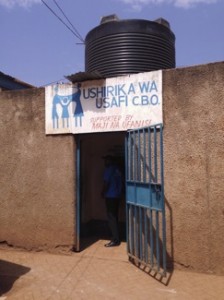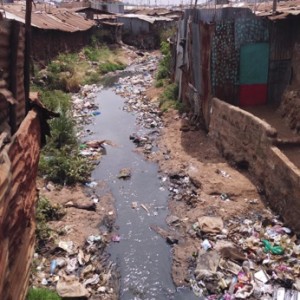My research delves into water and its governance in an urban poor context, investigating the informal settlement of Kibera in Nairobi Kenya. There has been very limited understanding of the cultural value of water and their governance by communities living in very informal urban settlements in the world. I completed my last of two fieldwork phases and I must say it has been
thrilling!
Recanting the thoughts of my trips, I consider it to be one of my most inspirational experiences. The idea sparked with trying to understand part of my own people, yet as a citizen of Kenya, I was yet to embark into the unknown. Kibera or ‘Kibra’, meaning outskirts of the forest, as the original Nubian settlers named it, is a place that has a negative perception and feared by most outsiders, since its inception in precolonial era of the growth of the Kenya-Uganda railway in the late 1800s’. Now about 50 years later post independence, I began my trip with zeal to gain a further understanding of this unknown, first by identifying relevant contacts to start my research and also approach the community and this is where I met, Bernard, a resident and community worker in Kibera who was eager to assist me with networking. I have been able to conduct a number of in-depth interviews and focus groups which has been smooth sailing.
And the results opened my eyes! After reading tons of papers and watching media on the largest urban ‘slum’ in Africa, nothing could have prepared me to witness how poverty stricken the people’s livelihoods are, living under a dollar a day with limited access to water and sanitation, as if living in a different world to the rest of city.
Furthermore, women and water cannot be disassociated when you step into this realm. Water collection for household use (cleaning, laundering, cooking and bathing) is mainly carried out by women. However, there is an aspect that denotes a lack of gender equality and a traditional approach. An interviewee states: “ It is the responsibility of the woman to fetch water…They (men) say that their job is to go for work and the women to fetch water. Even if the woman has work or is tired she will still fetch the water”. A change in beliefs and norms should see a shift in the role of women in water resources, due to their daily interaction with the resource, from the practical to management aspect.
Despite the difficulties posed, it is in this same “eyesore” that is Kibera, where inspiration for hope emanates, hope in despair, that is not shared with the rest of the city. A sense of belonging, multicultural and historical heritage seems to challenge the impossible. A much refreshing change as ethnic-related conflict after the general election in 2007, posed a big threat to Kibra’s existence. Community based organisations and NGOs flourish to ensure access,quantity and quality of water and the surrounding environs is present, vital tools under which the community manages its water and sanitation. Kibera is their home, and in the constant struggle and through their action, is the underlying plea of help.

Ushirika wa Usafi (Fellowship for
cleanliness) ,community led, provides
residents with water, bathing and toilet
facilities at an affordable rate.
Leaving Kibera every early evening, I would experience the dichotomy clearly present within the city in Nairobi. Feeling elated that amidst all the hardships there is a voice amongst the poor, a voice that leads researchers such as myself to pen and tell a tale, and a voice that has resonated in forthcoming outside assistance of new slum upgrading projects and programs to create a new face for Kibera. A powerful message to all that it is indeed time to “burst the bubble”.
About today’s blogger:
 Dennis Mailu is a PhD student at the University of Reading exploring urban ecosystem governance. Dennis is supervised by Professor Emily Boyd and Dr. Giuseppe Feola. He is a member of the SAGES Human and Environmental Group as well as the SAGES Resilience lab.
Dennis Mailu is a PhD student at the University of Reading exploring urban ecosystem governance. Dennis is supervised by Professor Emily Boyd and Dr. Giuseppe Feola. He is a member of the SAGES Human and Environmental Group as well as the SAGES Resilience lab.





